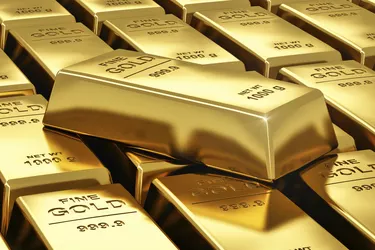
As the United States continues to deal with an unpredictable stock market, increased unemployment and a still-shaky housing market, you, like many other Americans, may be wondering whether the country is headed for another depression like the one it experienced in 1929. In fact, nobody can really predict if our economy will improve or slide further from a recession to a depression. The best strategy is to try to protect yourself by making the best investments possible.
Precious Metals
Video of the Day
The question, then, is what are the best investments you can make during a depression? Historically precious metals like gold and silver do well, as do stocks in these commodities. That's because precious metals have intrinsic value. There's a finite amount of things like gold and silver in the world, and unlike paper money, these things can't be created on a whim. Precious metals tend to be much better investments during a depression than stocks because you can never determine which ones will realize gains and which ones will experience devastating losses.
Video of the Day
Paying Off Debt
Although it may sound boring, paying off your debt is a good investment during a depression. First of all, when you pay off things like your car and house, you can rest assured that no bank will be able to foreclose on you, leaving you homeless or without transportation. In addition, if you pay your debts off, you will not have to pay interest on them, which is a guaranteed return on your investment of whatever the percentage would have been that you had agreed to pay on these loans.
Consumer Staples
If you have already paid off your debts and invested in precious metals, then you may be wondering if there is anywhere else you can put your money that would offer a decent chance of a return on your investment at a relatively low risk. You might consider consumer goods and the companies that make them. Think about the things you would go to the store to buy right away if you ran out of them, things like milk, bread, eggs, toilet paper, sanitary napkins, etc. Then do your homework to see which companies that produce these items seem to have the most stable fiscal numbers. In other words, you want companies that have been in business for several years that consistently pay dividends to their shareholders. These are the types of companies you might consider buying stock in during a depression.
Other Possible Investments
Some other relatively safe investments are government and corporate bonds, certificates of deposit (CD's), savings, and money market accounts. The way bonds work is that you pay a certain amount of money, say $50, and in 10 years you can cash it in for $100, so you have a guaranteed interest rate. But you can't get the money until the bond matures. The only danger you run into is if the company or government goes bankrupt and therefore is unable to make good on the payment. Although government bonds are supposed to be guaranteed because they can use tax revenue to pay out the money, there have been instances of countries like Russia defaulting on its domestic currency debt. CD's work similar to bonds only they are issued by banks and credit unions. Savings and money market accounts also offer a return on investment in the form of interest. But instead of having to wait to access your money, you can get to your money at any time. However, you usually earn a smaller rate of return than you do with bonds and CD's, so you have to determine how soon you might need the money before you decide which one would be the best investment for you.
The best investment strategy you can adopt is a conservative one. Put your money in things that you know have value, and steer clear of "fly by night" schemes or any investment you don't fully understand.